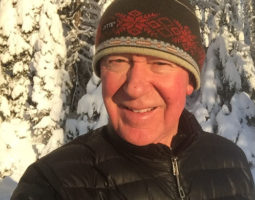Alumni Spotlight
Many Generations
One of our first WWAMI students speaks to the power of relationships in rural family medicine.
 Around the turn of the last century, Louise Renkin took a forested wagon trail from downtown Seattle to get to her classes on the University of Washington campus. She was earning a degree in English, and she was also a bit of a pioneer, remembers her grandson, Richard (Dick) McLandress, MD ’74. Renkin joined the first-ever women’s Husky rowing club in 1905. Later, she became a teacher at Wenatchee High School.
Around the turn of the last century, Louise Renkin took a forested wagon trail from downtown Seattle to get to her classes on the University of Washington campus. She was earning a degree in English, and she was also a bit of a pioneer, remembers her grandson, Richard (Dick) McLandress, MD ’74. Renkin joined the first-ever women’s Husky rowing club in 1905. Later, she became a teacher at Wenatchee High School.
“I inherited all of her books from college,” says McLandress, a family medicine doctor in Coeur d’Alene, Idaho. He also inherited her love for teaching. Six years ago, in fact, McLandress established the first family medicine residency in northern Idaho: the Kootenai Clinic Family Medicine Residency at Kootenai Health.
McLandress was spurred to create the residency when he realized how many family medicine doctors, like him, were near retirement. He joined the WWAMI Regional Family Medicine Residency Network — a group consisting of 30 family medicine programs — in order to provide more rural training opportunities for doctors. In addition to helping provide much-needed physicians for rural communities, McLandress knows that developing educational programs improves the entire culture of an institution.
“When you’re teaching, everyone asks more questions and tries to find ways to do things better,” he explains.
When McLandress teaches, he emphasizes the same skills he learned while attending the UW School of Medicine, skills that have served him well in practicing family medicine in a rural area. He wants trainees to learn to be competent, to be autonomous, and to understand the importance of relationships.
“I was surrounded by strong minds at the UW School of Medicine,” says McLandress. “I learned how to work as a team and to work on my own — it’s all part of a good medical education.”
McLandress had to learn these skills quickly because he, like his grandmother, was a UW pioneer. He joined the UW School of Medicine’s WAMI program during its inaugural year, 1972. (Wyoming would join the program later, adding the second “W.”) Eager to gain experience in rural medicine, McLandress and his mentor decided he should spend a couple of summers in the 5,000-person town of Colville, Washington.
“It was a phenomenal experience,” says McLandress. By the time he was a second-year medical student, he had delivered more than 20 babies. And his desire to become a rural family medicine doctor was cemented by his mentors: family medicine doctors who cared for extended families while also serving as community leaders.
McLandress and several of his peers established their family medicine practice in Coeur d’Alene 35 years ago. It is this long-term care — caring for people from birth to death, and caring for multiple generations in one family — that he finds truly appealing.
“That’s the beautiful thing about rural medicine,” says McLandress. “What keeps family doctors in the game is being able to have those relationships over time.”
When his daughter considered becoming a doctor, McLandress supported her. Like her father, she graduated from the UW School of Medicine and enjoyed her WWAMI experience. Today, she is an OB/GYN in Bend, Oregon.
McLandress has some advice for the next generation considering the medical profession — and for doctors considering mentoring the next generation.
“Dive in, and don’t be afraid,” he says.

